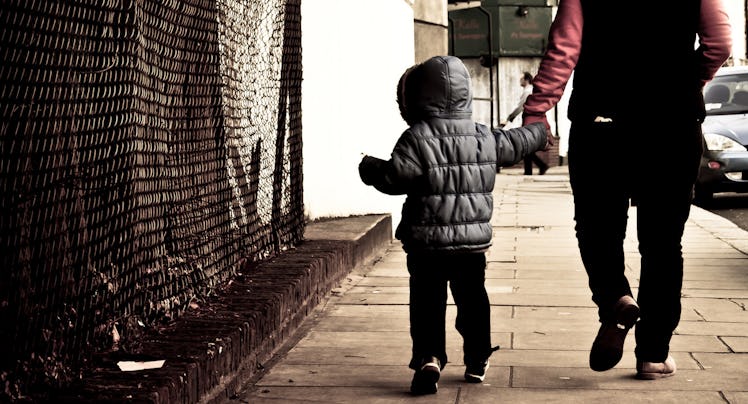My 6-Year-Old Son Has Anxiety Issues And I’m At The End Of My Rope
"The path to self pity is easy with the big A."

The following was syndicated from Babble for The Fatherly Forum, a community of parents and influencers with insights about work, family, and life. If you’d like to join the Forum, drop us a line at TheForum@Fatherly.com.
My wife and I have a code letter we use in our house.
“Is this A?” we’ll ask each other.
At those times, we’re trying not to tip our 6-year-old son off to what we’re thinking. And no, we’re not suspicious of his possible adultery.
Pixabay
Rather, we’re constantly trying to figure out why our son is being rude/loud/obnoxious/obstinate in a given moment. Why he’s fighting so hard to do something he doesn’t want to do. Or why he’s acting up hours before we are scheduled to do something he typically loves to do.
Is he just being a brat? Or is this a cover for the big A — anxiety?
It’s a massive often painful challenge to decipher these moments. For any normal person, when your kid says he hates you or hates movies or hates the ocean or isn’t going to this party or isn’t going to the bowling alley he’s been to 10 times before, or decides hitting his brothers or breaking something in the kitchen is the best way of coping with whatever is bothering him, the natural human protective response is to lash back. To take insult. To feel ignored or hurt or unappreciative. To take it personally, or to see it as a behavior that is unacceptable and must be addressed immediately.
Why does our son have to deal with this? How can we help? Will he outgrow it?
How dare you? You little sh-t. Do you think I like spending my Saturdays going to pee wee soccer? Do you really think I want to go to Kenny B’s bouncy party right now? How can you speak to me that way after the fun we just had, after the hugs and the snuggles and the book we read last night, or the moment we shared laughing just this morning? How could you? Who are you?
It’s still hard to recognize even though we’ve had lots of experience. Our son’s A doesn’t look like you’d think. You might expect classic shyness — some hiding, simple crying, or basic skittishness. No, his anxiety is different.
Yet it’s just as real and uncontrollable. And it still needs to be dealt with calm restraint and skill and comforting words — but not too much comfort lest you end up patronizing, or antagonizing. Sadly, general detachment is often the best approach.
Public Domain
And just wait until you throw an audience into the mix. People, even other parents of young kids, don’t recognize the big A. They see a bad kid whose parents have failed. If only they’d instilled discipline. Now it’s too late. How can they let him talk back that way? I’d never stand for any of that.
That all makes it so much harder and painful. And that much more likely that you break the calm, abandon the strategy you know, and go hard back. Yelling, discipline, threats.
None of which typically diffuse the behavior, let alone treat the anxiety.
It’s all so sad and unfair (yes, kind of like all of parenting).
Remind yourself of past successful battles, and provide yourself with evidence from past experiences that show you you can do it.
Why does our son have to deal with this? How can we help? Will he outgrow it? The path to self pity is easy with the big A.
It turns out it takes lots of time. Painstaking therapy. Subtle treatments that seem fruitless like showing him pictures of videos of past successes, reminding him of other times he’s conquered fears, or having him recite mantra or use verbal skills that are designed to help him think through more likely scenarios and pointing out how irrational worst-case scenario fears are.
This is heavy stuff for anyone, let alone 6-year-olds who are hardly the most insightful, in-touch bunch. And then try to implement these skill in the heat of the big A’s wrath, when both you and your child have lost any sense of perspective.
Pixabay
So mostly it just hurts. And then there’s frequently some shame and regret that you weren’t able to handle things better.
There are some victories. Conquered bike rides. Rage-free play dates. Fears that are less feared this time around.
Along the way, you wonder, What am I losing? What is our son losing each time he goes through these episodes. That’s when you need to take the same sort of steps you push on your child. Remind yourself of past successful battles, and provide yourself with evidence from past experiences that show you you can do it.
After all, your child’s A probably didn’t come from nowhere.
Doug Parker is a writer for Babble. You can read more from Babble here:
Want tips, tricks, and advice that you’ll actually use? Click here to sign up for our email.
This article was originally published on